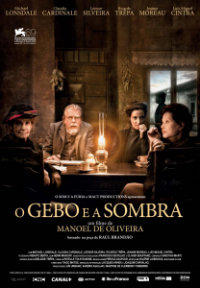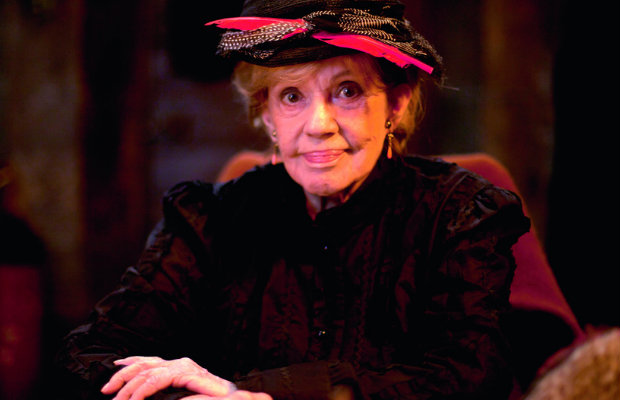Reviews
Gebo and the Shadow | Review
The Shadow Knows: Oliveira’s latest a Stringent Meditation on Sacrifice
 Inevitably, any discussion pertaining to recent work from Portuguese director Manoel de Oliviera will make mention of the fact that he’s currently the world’s oldest filmmaker at the age of 105. He shows little sign of slowing down, with a short film currently in development and another feature he’s currently trying to fund. After playing the festival circuit in 2012, his latest, Gebo and the Shadow, is an adaptation of a stage play by Raul Brandao, finally landing in theaters, though playing solely in one theater in New York City. It’s a pity it won’t have a wider platform, considering the film’s rather ascetic beauty as well as its bleak examination of poverty and familial sacrifices, made all the more accessible (at least compared to his last effort, 2010’s The Strange Case of Anjelica) with iconic actors like Michael Lonsdale, Claudia Cardinale, and Jeanne Moreau adorning the minuscule cast.
Inevitably, any discussion pertaining to recent work from Portuguese director Manoel de Oliviera will make mention of the fact that he’s currently the world’s oldest filmmaker at the age of 105. He shows little sign of slowing down, with a short film currently in development and another feature he’s currently trying to fund. After playing the festival circuit in 2012, his latest, Gebo and the Shadow, is an adaptation of a stage play by Raul Brandao, finally landing in theaters, though playing solely in one theater in New York City. It’s a pity it won’t have a wider platform, considering the film’s rather ascetic beauty as well as its bleak examination of poverty and familial sacrifices, made all the more accessible (at least compared to his last effort, 2010’s The Strange Case of Anjelica) with iconic actors like Michael Lonsdale, Claudia Cardinale, and Jeanne Moreau adorning the minuscule cast.
Set almost entirely within the cramped, dank living space of Gebo’s (Michael Lonsdale) unfortunate apartment, we learn the decrepit patriarch is an accountant that supports his daughter-in-law, Sofia (Leonor Silveira) and wife Doroteia (Claudia Cardinale) with a meager income. As Sofia and Doroteia await his return home from work, they prepare his ritual coffee, and discuss their shared distress over the absence of husband and son, Joao (Ricardo Trepa), a fugitive from the law that they’ve not seen for some time.
More discussion ensues upon Gebo’s presence, who seems more preoccupied with the never ending bookkeeping that will keep him awake far into the cold, cruel night, a bag of other people’s money resting at the table like some cancerous temptation. It appears many truths about Joao are kept secret from his mother, and a telling aside transpires between Gebo and his daughter-in-law, who it turns out was a child they took in as a young girl. Then, suddenly, Chamico (Luis Miguel Cintra) a family friend, makes an appearance and livens their spirits, along with another neighbor lady, Candidinha (Jeanne Moreau), who discovered the original recipient of her attention isn’t at home, so she needs a place to roost a bit for coffee and biscuits. And then, like a ghost, appears controversial Joao, whose conversations reveal a markedly different perspective on life than his father’s.
Filmed nearly entirely within the confines of this small apartment, Gebo and the Shadow sounds very much like a stage play. However, Renato Berta’s cinematography looks like a moving canvas, a kerosene lamp providing the minimal light source that makes the dismal surroundings appear as cozy as an oil painting come to life (Berta, it must be noted, has worked with some of the world’s most renowned French auteurs, with names like Malle, Resnais, Chabrol, and Rohmer to list just a small sampling of his resume).
While Malle’s muse Moreau turns up for a brief moment of benign levity in this tableau, it’s Lonsdale, Cardinale, Silveira and the persistent suffering of their characters that really bring life to Gebo. If it’s first half is a patience courting set-up of informative pipe laying, the muted rewards are in its examination of noble sacrifice in the final frames. Lonsdale and Cardinale are on opposite ends up coping, while the melancholy Silveira discovers she may not be as committed to the idea of a man she once knew. Ricardo Trepa, who has starred in Oliveira’s last several films, plays like a cipher of ideas, nearly conjured out of the persistent will of the other characters, his mouth and actions toppling a vile streak of rebellion and discord into the lives of those simply awaiting his return. The opening moments of the film show Trepa’s Joao alone aboard a ship, as if to signify, before we’ve even been introduced to his family, that his has figuratively sailed.
Gebo and the Shadow plays like a tenuous exercise in its examinations of morality of responsible choices vs. the fleeting freedom to live life as one would prefer. It may be directed by the world’s oldest director, but it’s one of Oliveira’s most potent and rewarding titles from this late portion of his career, as well as an indication that he’s lost none of his talents as one of the world’s notable directors.
Los Angeles based Nicholas Bell is IONCINEMA.com's Chief Film Critic and covers film festivals such as Sundance, Berlin, Cannes and TIFF. He is part of the critic groups on Rotten Tomatoes, The Los Angeles Film Critics Association (LAFCA), the Online Film Critics Society (OFCS) and GALECA. His top 3 for 2021: France (Bruno Dumont), Passing (Rebecca Hall) and Nightmare Alley (Guillermo Del Toro). He was a jury member at the 2019 Cleveland International Film Festival.






















